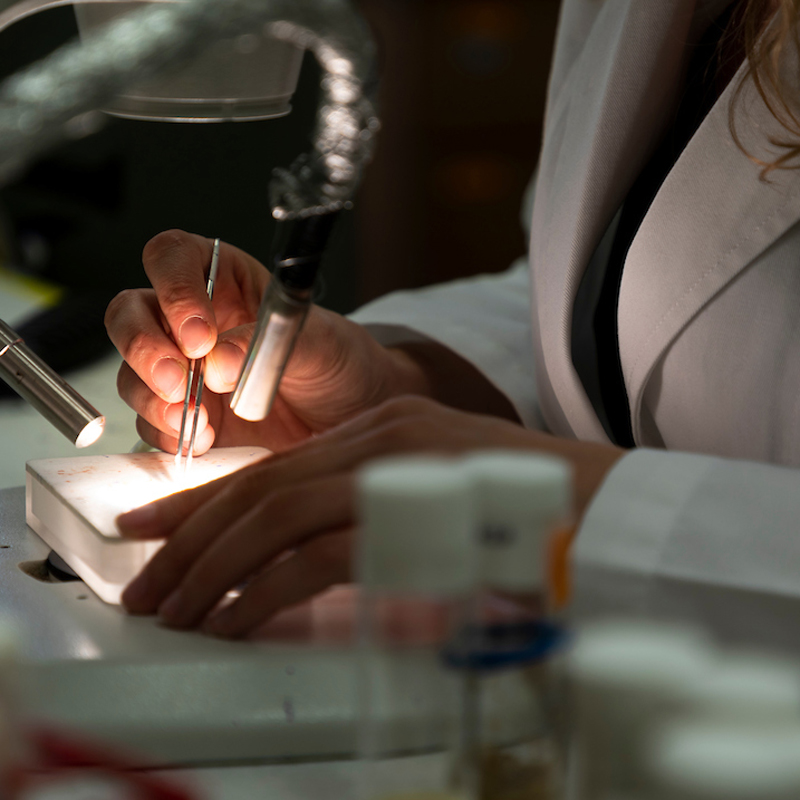
Medical Laboratory Science – Bachelor’s Degree Program (BS)
Study Medical Laboratory Science at the University of Montana
Like science? Want to perform laboratory analyses used in the diagnosis and treatment and prevention of disease? The medical laboratory science degree prepares you for a career as a certified Medical Laboratory Scientist (MLS), and our trainees are actively recruited by regional hospitals and clinical labs.
The program provides a strong background in the sciences and encourages extensive experiential learning and research opportunities. You can choose from two tracks — either three (3+1) or four (4+1) years of coursework at UM — both with hands-on experience that sets the stage for a successful career path, including training on how to operate complex instrumentation and perform and interpret biomedical analyses.
affiliated clinical sites for training
job placement rate for graduates for the Montana Medical Laboratory Science professional program.
What can you do with a medical laboratory science degree?
Medical laboratory science is a multidimensional field that requires a sharp mind, willingness to help others and continuous learning. It’s also a profession that’s in very high demand: around 75% of all patient care requires laboratory testing. Also, while the need nationwide for MLS is 12,000/year, only about 4,500 individuals are trained in the profession each year.
While most Medical Laboratory Scientists work in hospital laboratories, there are many other opportunities, from forensics to humanitarian work. Case in point: Sean Wolf, MBA-HA, received his bachelor’s degree at UM, and after serving for several years as a Medical Laboratory Scientist, he’s currently working at Children’s Hospital Colorado as a process improvement specialist.
What is medical laboratory science?
Simply put, medical laboratory science involves the analysis and diagnostic testing of a variety of biological specimens, including blood and body fluids, in clinical laboratories.
Jobs in medical laboratory science
- Hospital/medical center laboratories
- Healthcare administration
- Public health clinics
- Information systems specialist
- Teaching
- Hospital educator coordinator
- Clinical instructor
- Humanitarian work
- Research assistant
- Clinical trial coordinator
- Forensic technologist
Medical laboratory science salaries
With a bachelor’s degree in medical laboratory sciences, you can expect to earn an annual starting salary of about $65,000 in Montana. The US Bureau of Labor Statistics cites medical and clinical laboratory technologists earning $62,440.
Programs
- Medical Laboratory Science 4+1
- Medical Laboratory Science 3+1
- Major in Biology Bachelor's
- Major in Microbiology Bachelor's
“The courses and professors that I learned from while obtaining my degree set the foundation for my success in the healthcare industry. I use the critical thinking and problem-solving skills from my undergrad degree daily and am thankful for the guidance I received while at UM.” - Sean Wolf- MLS, MBA-HA, Children’s Hospital Colorado
Experiential learning in the medical laboratory science degree program
“Learning from doing” is on full display in the medical laboratory science degree program at UM. After all, there’s no better training ground for MLS than the clinical laboratory setting. Whether you choose the 3+1 or 4+1 track, you’ll be incredibly hands-on.
Internships for medical laboratory science majors
3+1 students do a one-year clinical internship in the senior year at either the Montana Medical Laboratory Training Program or the School of Medical Laboratory Science at Sacred Heart Hospital in Spokane, Washington. After the internship, you’re awarded a bachelor’s degree from UM. Pass a national exam administered by the American Society of Clinical Pathologists (ASCP) and you’ll receive medical laboratory science certification/licensure.
4+1 students receive a bachelor’s degree in medical laboratory science upon completion of their four years at UM. You can choose to apply to any NAACLS-certified MLS program, or use your degree for other professional pursuits such as medical school or graduate school.
The clinical internship portion of the medical laboratory science degree is accredited by NAACLS (National Accrediting Agency for Clinical Laboratory Scientists).
Undergraduate research experiences for the bachelor’s in medical laboratory science
Undergraduate research is also encouraged, and MLS majors frequently do independent research projects in the labs of biology and chemistry faculty members.
Career development in the medical laboratory science major
The medical laboratory science program is designed to prepare students for a clinical lab career by tailoring their curriculum, lab experiences and clinical internship to meet specific requirements for American Society of Clinical Pathologists (ASCP) licensure.
You’ll find a special learning atmosphere where faculty interact directly with students, follow their progress through all years at UM, and advise them on how to enhance their portfolio for career-readiness.
UM students also have the added advantage of the Montana Medical Laboratory Science Professional Program, a university-based program that provides the opportunity for UM students to train for a professional career in medical laboratory science. The program consists of a summer semester at MSU in Bozeman and two semesters in a Montana hospital. After completing their clinical year and undergraduate coursework, students are eligible to take a certification exam and become a professional Medical Laboratory Scientist (MLS).
Networking in the medical laboratory science program
The medical laboratory science degree program is part of University of Montana Health & Medicine (UMHM), a large interdisciplinary group of over 60 majors. UMHM fosters student networking with peers and faculty in related fields of study.
Scholarships for medical laboratory science majors
3+1 students are eligible for undergraduate financial aid and scholarships, including the George L. Card Memorial Scholarship and William Hardy Esbaugh III Scholarship.
Learn more about scholarships for medical laboratory science majors.
Clubs and student organizations for medical laboratory science majors
Many medical laboratory science students are members of the Pre-Med Club, a natural fit for future Medical Laboratory Scientists.
Explore classes for medical laboratory science
The medical laboratory science curriculum includes courses such as Biochemistry, Organic Chemistry and General Parasitology, as well as Virology, Immunology and Medical Bacteriology — courses that are highly relevant to today’s current events and global public health.
View all classes for the bachelor’s degree in medical laboratory science.